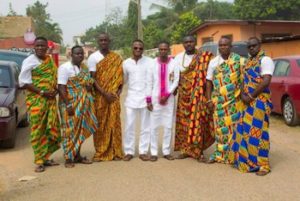
*The Ashanti people are celebrated on this date in 1650. Also known as Asante, they are part of the Akan ethnic group and are native to the Ashanti Region of modern-day Ghana.
The Asante speak the Twi language. Over nine million Asante people speak Twi as a first or second language. The wealthy, gold-rich Asante people developed the large and influential Asante Empire along Lake Volta and the Gulf of Guinea. The empire was founded in 1670, and the Asante capital, Kumasi, was founded in 1680. Located at the crossroads of the Trans-Saharan trade routes, the Kumasi megacity's strategic location contributed significantly to its growing wealth. Throughout the Kumasi metropolis' existence, several peculiar factors have combined to transform the Kumasi metropolis into a financial center and political capital. The main causal factors included the unquestioning loyalty to the Asante rulers and the Kumasi metropolis's growing wealth, derived partly from the capital's lucrative domestic trade in items such as bullion.
The Ashanti live in Ashanti, specifically in the Ashanti capital, Kumasi metropolis, and due to the Middle Passage, a known diaspora of Ashanti exists in the Caribbean, particularly in Jamaica. Slaves captured by the Ashanti and sold to the British and the Dutch along the coasts were sent to the West Indies, particularly Jamaica, Barbados, the Netherlands Antilles, the British Virgin Islands, the Bahamas, etc. Ashanti is known to be very opposed to both the Fante and the British people, as the Ashanti only traded with the Dutch in their ascension to becoming a hegemony of most of the area of present-day Ghana. The name Coromantee (from Fort Amsterdam, purchased by the Dutch in 1665) came from the original British fort on the Gold Coast to host Ashanti captives, despite this fort being used by the Dutch and having no records of trade to Jamaica while being under Dutch ownership.
Evidence of Ashanti and Akan-day names and Ashanti and Akan surnames (but mispronounced by the English), Adinkra symbols on houses, Anansi stories, and the dialect of Jamaican Patois being heavily influenced by the Ashanti language (Ashanti Twi), can all be found on the island of Jamaica. Edward Long and white British planters before him described "Coromantees" the same way that the British in the Gold Coast would the "Ashanti’s", which was to be "Warlike". Edward Long states that others around "Ashanti’s" and "Coromantees" feared them the same way as they were feared in Jamaica and from the communities of the Gold Coast. According to BioMed Central (BMC biology), in 2012, the average Jamaican had 60% of Ashanti matrilineal DNA, and today, Ashanti is the only ethnic group by name known to contemporary Jamaicans.
Jamaican individuals such as Marcus Garvey and his 1st wife, Amy Ashwood Garvey, are of Ashanti descent. It is commonplace for many Jamaicans to have this descent. Also, there were Jamaican freedom fighters during slavery: Nanny of the Maroons (now a Jamaican National Heroine), Tacky and Jack Mansong, or three-finger Jack. The names Nanny and Tacky are English corruptions of the Ashanti words and names: "Nanny" is a sleaze of the Ashanti word Nana to mean "king/queen/grandparent," the name Tacky is a sleaze of the Ashanti surname Takyi, and Mansong is a sleaze of the Ashanti surname Manso. The family and the mother’s clan are most important to the Ashanti. A child is said to inherit the father’s soul or spirit (ntoro); from the mother, a child receives flesh and blood (mogya).
Boys are trained by their fathers at the ages of eight and nine. They are taught a skill of the fathers' choice. The father is also responsible for paying for school. Marriage is vital to Ashanti's communal life, and it can be polygamous. Men may want more than one wife to express their willingness to be generous and support a large family. Women in the Ashanti culture will not marry without the consent of their parents. Many women do not meet their husbands until they are married. Divorce is rare in the Ashanti culture, and both parents must keep the marriage going.